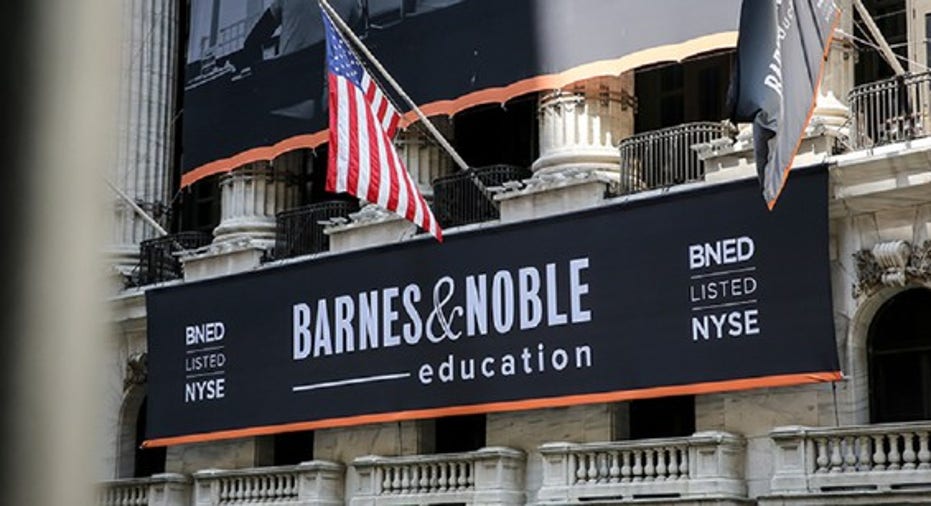Barnes & Noble Education Starts the School Year With Wider Losses, Flat Sales

Image source: Barnes & Noble Education.
Having a brick-and-mortar presence is especially important in the college environment, and Barnes & Noble Education (NYSE: BNED) has worked hard to build a presence at many colleges and universities across the nation. As the new school year starts, so too does B&N Education's new fiscal year, and coming into Thursday's fiscal first-quarter financial report, B&N Education investors had hoped the company would be able to narrow its losses and post at least moderate gains in revenue. The college bookstore specialist wasn't able to deliver on those hopes, but it still has confidence in its long-term prospects. Let's look more closely at the latest from Barnes & Noble Education to see what happened and what's ahead for the company.
Barnes & Noble Education fails its first test
Barnes & Noble Education's fiscal first-quarter results reversed the optimism that its most recent quarterly report had generated. Revenue came in at $239.2 million, up just a tenth of a percent from year-ago levels and falling well short of the $245.6 million most investors had expected to see. The company reported a net loss of $27.9 million, which was $1 million more than its losses from the previous year's fiscal first quarter. Some of the wider loss came from restructuring and transaction costs that won't recur, but even though the per-share loss of $0.60 per share was down from year-ago levels, that was largely because the company had more shares outstanding this year than last.
Looking more closely at B&N Education's numbers, some troubling aspects stood out. Comparable-store sales fell 2.8%, returning the company to negative comps after a nice rise three months ago. B&N blamed the decline on particularly weak textbook sales, which were down 6.8% from year-ago levels. A 1.6% rise in general merchandise sales offset some, but not all, of the downward pressure from textbooks. In addition, B&N said it paid $1.8 million in restructuring costs to reduce staff and close facilities related to moving its Yuzu eTextbook platform to the VitalSource platform.
The tepid financial performance didn't stop B&N Education from continuing its growth efforts. The college bookstore retailer opened 33 new stores during the quarter and closed 14 locations, bringing its new store-network total to 770.
B&N Education CEO Max Roberts put the results in context: "Our first quarter results reflect the typical seasonality of our business," Roberts said, "with schools in summer semester throughout the country." The CEO argued that lower comps have come from falling student participation in summer classes, a trend he clearly hopes won't have a corresponding impact on enrollment during the more traditional portion of the school year.
How can B&N Education get smarter?
B&N Education has confidence in its longer-term prospects. Discussing the company's falling textbook sales, Roberts said, "our initiatives to expand our product offerings have partially offset this, with general merchandise sales now representing approximately 50% of the total sales for the quarter." B&N is well-positioned for its fall rush period, and the company hopes to make stronger partnerships to take full advantage of the opportunity to serve students.
B&N Education's guidance remained similar to what the company has predicted in the recent past. The college bookstore retailer still expects total sales to grow between 2% and 4%, and that's squarely aligned with investor expectations. A range for comparable-store sales of between flat and down 2% still seems like a low bar for success, but continued growth in store counts should offset any decline in comps.
B&N Education investors reacted negatively to the report, sending the stock down 8% when it opened for morning trading following the announcement. For B&N to succeed, it will need to find ways to grow its business both through expansion and organic efforts to make its locations the go-to places for college students across the nation.
A secret billion-dollar stock opportunity The world's biggest tech company forgot to show you something, but a few Wall Street analysts and the Fool didn't miss a beat: There's a small company that's powering their brand-new gadgets and the coming revolution in technology. And we think its stock price has nearly unlimited room to run for early, in-the-know investors! To be one of them, just click here.
Dan Caplinger has no position in any stocks mentioned. The Motley Fool owns shares of Barnes and Noble Education. Try any of our Foolish newsletter services free for 30 days. We Fools may not all hold the same opinions, but we all believe that considering a diverse range of insights makes us better investors. The Motley Fool has a disclosure policy.



















